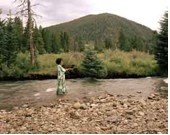PS: Parsing Spirituality
dal 9/1/2009 al 16/2/2009
Segnalato da
Janine Antoni
Sebastiaan Bremer
Melissa A. Calderon
Gordon Cheung
Graham Caldwell
Andrea Galvani
Dan Kopp
Ivan Navarro
Lisa Ross
Courtney Smith
Xaviera Simmons
J. G. Zimmerman
Micaela Giovannotti
9/1/2009
PS: Parsing Spirituality
Affirmation Arts, New York
Group show

curated by Micaela Giovannotti
Affirmation Arts is pleased to present the
most recent exhibition from international curator Micaela Giovannotti
opening January 10th 2009. PS: Parsing Spirituality examines the recent
resurgence of spirituality in contemporary art. Featuring artists: Janine
Antoni, Sebastiaan Bremer, Melissa A. Calderon, Gordon Cheung, Graham
Caldwell, Andrea Galvani, Dan Kopp, Ivan Navarro, Lisa Ross, Courtney Smith,
Xaviera Simmons, and J. G. Zimmerman.
"Every work of art is the child of its age and, in many cases, the mother of
our emotions"
(Concerning the Spiritual in Art, W. Kandinsky.)
After being neglected for quite some time, spirituality has risen to the
surface in contemporary art. Art has both advertised and glorified
religions, but contemporary art has generally distanced itself from the
spiritual realm, focusing its lens on formal and conceptual tenets. Not
surprisingly, as often happens in times of secular uncertainties and
political and economic turmoil, there is currently a resurgence of interest
in spirituality, wherein artists are exploring and re-defining themselves in
their work with very introspective and personal means and approaches.
“I am struck by two simultaneous desires: to hold, and to be held," artist
Janine Antoni commented regarding her work Coddle. “I see my foot as Other
because it is the furthest point from my heart. To bring my leg back up into
my chest not only brings me back to the fetal position, but to a position of
loving myself. Still the impossibility of fulfillment remains. When I apply
this to the familiar image of the Mother and Child, I explore it from the
perspective of my own ability.”
As iconographically explicit as Antoni's recapitulated Virgin and Child in
Coddle, are Gordon Cheung's paintings from the Paradise Lost series.
Translating the prints of John Martin, the artist captures the shared
parallel structures of capitalism and religions representing how both
operate with dynamic systems of fear to motivate believers into a
“progressive” movement by promising either paradise and riches or hell and
poverty.
In Lisa Ross' Unrevealed series, the iconography is rather more mysterious
with Uyghur holy sites in northwest China, portrayed devoid of human
presence, which might at first appear to be sculptures or earthworks. The
impermanence and fragility of the holy sites placed in the desert is
balanced out by the inherent anthropomorphic power of nature.
J. G. Zimmerman's first episode of the Dystopia series utilizes imagery of
oil tanks gathered from the Middle East to construct minimalist abstract
landscapes. A metaphorical devotion towards these oil sites weds the
artist's fascination for systems and subsystems. These are interpreted as
the human impulse and desire to "create" in an attempt to come to a better
understanding of our "creator".
Sebastiaan Bremer's miniature, Diamond Night, portrays an idealistic starry
landscape inspired by his Dutch homeland and an early etching by Rembrandt.
The esoteric power of the color white is explored in the work of
M.A.Calderón. In Permanence of Pain, layered veils of fragile, gossamer
tissues stained with the artist's tears become a larger than life
installation. The artist expresses a whirlwind of emotions, clashing
cultural ideologies and the internal conflicts of the stereotypical Latina
role in society.
Immersed within the solitary vastness of the landscape, the female role is
also protagonist in Xaviera Simmons' photographs, Denver and Make the Fist.
Simmons' iconic figures dominate the narrative, lone invaders involved in
private rituals, within but not really part of the landscape fertile with
immanent life.
In Andrea Galvani's L'intelligenza del Male (The Intelligence of Evil,) the
silhouette of a man standing alone magically dissolves into black smoke.
Unreasonably calm, the scene is set against a snowy backdrop that obscures
the horizon. It is unclear whether the man has begun to experience his death
sentence while waiting in the purgatory or if he is the victim of an
inexplicable spell.
Mythology and magic play a pivotal role in Graham Caldwell's glass
structures that hover between the organic and the otherworldly. His interest
develops not in terms of science, but rather in terms of myth, referencing
the epic wars fought within the microcosms of our very bodies.
Apocalyptic and eerie are Dan Kopp's translucent paintings that hover
between abstraction and figuration. A color-saturated foreground resembling
broken stained glass or a chemical pattern observed under the microscope, is
in dialogue with a more ethereal and psychological background that recedes
almost to the infinite.
Ivan Navarro's Assembly Line challenges spatial perception through mundane
materials and light. It encourages one to reflect upon objects and the
structures of our surroundings while optically creating a crater that drags
the viewer down below the ground. Navarro's collaboration with artist
Courtney Smith sprang from a mutual interest in existing objects - hand-made
or mass-produced - that still linger in the domestic realm, courting
functionality, albeit impossibly. Bohemia, from the Dovetail series of
binary compositions, bears a hanging chandelier visually grounded by wooden
seating below, forming a meditation station that invites four people to
share very close seats that remain, nonetheless, separate and independent.
Opening Reception: January 10, 2009 : 6pm-9pm
Affirmation Arts
523 West 37th Street - New York
Gallery hours are Monday-Friday 10am-6pm and Saturdays11am-5pm.
Free admission



